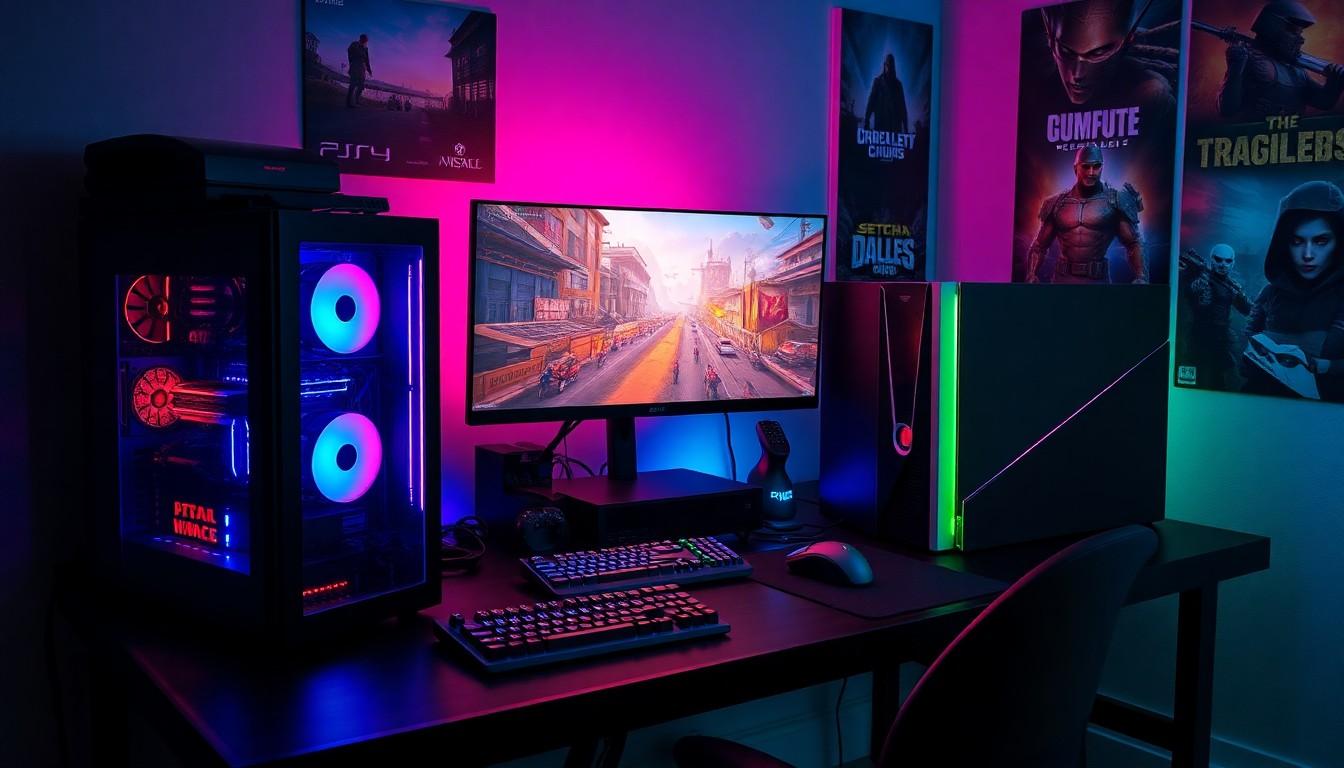In the epic showdown of PC gaming versus console gaming, two titans clash for the hearts and thumbs of gamers everywhere. On one side, you have the customizable powerhouses of PCs, boasting graphics that could make a sunset weep with envy. On the other, the sleek convenience of consoles, promising an effortless gaming experience with just a push of a button—no tech degree required.
PC Gaming vs Console Gaming
PC gaming offers higher customization potential, enabling players to upgrade hardware components like graphics cards and processors. Enhanced graphics capabilities often lead to a more immersive experience, especially with high-resolution displays. Additionally, the flexibility of controls allows gamers to choose between keyboards, mice, or various controllers, catering to personal preferences.
On the other hand, console gaming emphasizes user-friendliness and convenience, appealing to a broader audience. Consoles like the PlayStation and Xbox provide simple plug-and-play setups. Popularity stems from exclusive titles, which some franchises develop solely for consoles, attracting dedicated fan bases.
Price differences also play a significant role in the PC vs console debate. While the initial investment for a gaming PC can be higher, long-term costs may balance out with sales on digital platforms. Digital storefronts on PCs frequently feature discounts on games, making them more accessible.
Social gaming dynamics impact player experiences across platforms. PC gamers often engage in competitive gaming with access to a wider array of online titles and esports. Consoles streamline multiplayer interactions, easily allowing friends to connect via shared networks.
Both PC and console gaming present unique advantages. Players who value graphics and performance may gravitate toward PCs. In contrast, individuals seeking straightforward access may prefer consoles. This ongoing debate continues to shape the gaming landscape, with each platform offering distinct experiences that resonate with different audiences.
Performance Comparison

Performance significantly varies between PC gaming and console gaming, influenced by hardware and game execution.
Hardware Specifications
PC gaming typically boasts superior hardware specifications. High-end graphics cards enhance visual fidelity, enabling smoother frame rates and richer textures. Processors in gaming PCs often outperform their console counterparts, handling complex tasks effortlessly. Gamers frequently invest in customizable components such as RAM, storage, and cooling systems, leading to personalized setups tailored to specific gaming needs. Conversely, console hardware remains fixed, limiting upgrades. Console gamers rely on standardized performance, ensuring consistent experiences across all units. While PCs provide options for performance boosts, consoles deliver convenience with plug-and-play simplicity.
Game Performance
Game performance showcases notable differences tied to platform capabilities. High-performance PCs often achieve higher frames per second, delivering fluid gameplay even during intense action scenes. Console games focus on optimizing performance for specific hardware, ensuring stable settings for a wide audience. Load times on PCs frequently benefit from faster SSDs, leading to quicker game launches and smoother transitions. However, consoles thrive with exclusive titles, optimized for their specific systems, enhancing overall gaming experiences. Each platform presents unique strengths, with PC gaming emphasizing power and customization, while console gaming prioritizes accessibility and optimized performance.
User Experience
User experience plays a crucial role in the ongoing debate between PC gaming and console gaming. Each platform offers distinct features that cater to varied preferences.
Control Methods
Control methods significantly influence gameplay comfort and precision. PCs typically offer keyboard and mouse configurations, enabling advanced controls in many competitive games. For instance, the precision of a mouse allows for accurate aiming in first-person shooters. Alternatively, consoles utilize gamepads, which provide ease and simplicity for casual gamers. These controllers are often designed for ergonomic comfort, making long gaming sessions more enjoyable.
Online Gaming Experience
Online gaming experience varies between PCs and consoles. Many PC games support extensive modding communities, enhancing gameplay with user-generated content. On the other hand, consoles facilitate seamless multiplayer experiences through integrated services like PlayStation Network and Xbox Live. These platforms often simplify matchmaking, ensuring friends can connect easily. PCs may offer more competitive gaming opportunities, especially in esports, while consoles excel in accessibility and straightforward group play.
Cost Analysis
Cost considerations play a crucial role in the debate between PC gaming and console gaming. Understanding the financial aspects helps gamers make informed choices.
Initial Investment
The initial investment for a gaming PC typically exceeds that of a console. High-end graphics cards and processors contribute to the elevated price. Entry-level gaming PCs may start around $500, while premium setups often exceed $1,500. In contrast, current-generation consoles like the PlayStation 5 or Xbox Series X sell for approximately $499. Consideration of accessories, such as monitors, keyboards, and headsets, further increases the budget for PC gaming. Overall, upfront costs tend to favor consoles, appealing to gamers seeking a straightforward entry point into gaming.
Long-Term Costs
Long-term costs reveal a different perspective in the gaming landscape. Frequent discounts on digital titles for PCs lead to substantial savings over time. Steam and other platforms often promote seasonal sales, enabling gamers to purchase games at lower prices. In contrast, the costs for console gaming include subscription fees for services like PlayStation Plus or Xbox Live, which accumulate annually. Additionally, consoles have limited backward compatibility and fewer ongoing discounts. While the initial upfront cost for PCs is higher, the cumulative savings often result in an overall lower cost of ownership for dedicated PC gamers.
Game Library and Availability
Game libraries and accessibility represent a significant factor in the debate between PC gaming and console gaming. Each platform provides various benefits and considerations regarding available titles.
Exclusive Titles
Exclusive titles frequently draw gamers to specific platforms. Consoles like PlayStation and Xbox offer games unavailable on PC, appealing to dedicated fan bases. For instance, franchises like “The Last of Us” and “Halo” highlight the unique draws of console gaming. Meanwhile, PCs provide access to a broader range of indie games and mods, enhancing the library experience. Titles such as “Counter-Strike” and “Dota 2,” not to mention MMO giants like “World of Warcraft,” thrive on this platform. Thus, both ecosystems present distinct exclusive offerings that can influence gamers’ choices.
Backward Compatibility
Backward compatibility often affects long-term gaming satisfaction. Consoles like Xbox Series X lead in this area, allowing users to play a vast array of older games without issue. Gamers appreciate the ability to revisit classic titles seamlessly. Conversely, PCs typically do support older games, but compatibility can vary based on system specifications. Steam and other platforms often provide support for older games, enhancing accessibility. Gamers seeking to keep their libraries intact may find that consoles offer a smoother experience in maintaining their game collections.

